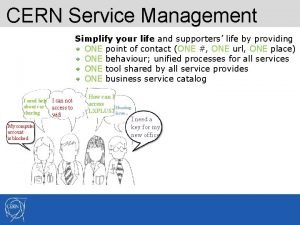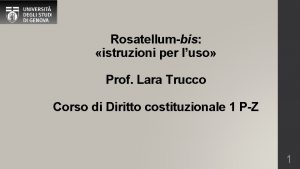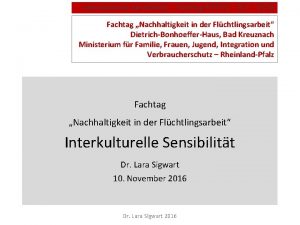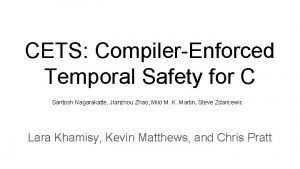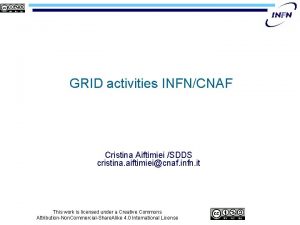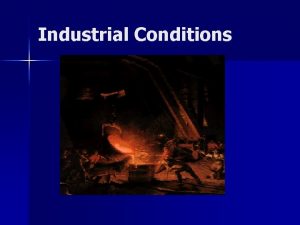Industrial Services at CERN Cristina Lara Definition of























- Slides: 23

Industrial Services at CERN Cristina Lara

Definition of industrial services at CERN Ø Pluri-annual contracts (min. of 3 years up to 7 years in total); Ø High manpower component; Ø Executed on the CERN site (either in France, Switzerland or both); Ø For recurrent activities, maintenance of equipment or small works such as…

Facilities management

Transport and handling

Welding

Welding and electromechanical work

Cabling


Mechanical workshop

HVAC

Procurement Principles CERN awards orders and contracts in compliance with the principles of transparency and impartiality; Ø CERN’s tendering procedures are selective and do not take the form of open invitations to tender or price enquiries. They shall, in principle, be limited to firms established in the Member States; Ø Requirements are specified in an objective way so as to guarantee fair competition. Ø Two methods of orders/ contract award: Ø ü ü Lowest compliant bidder (subject to fair industrial return considerations) Best value for money (BVFM)

Challenges: (re-)tendering IS contracts Strikes/ trade unions pressure against retendering; Ø Compliance with legal framework (+ scrutiny by local authorities) : 4 P, “Délit de marchandage”, work outside normal working hours, etc. ; Ø Little competition (few bidders that already know CERN too well) difficult/impossible to introduce newcomers; Ø BVFM. Ø

Particularities in the adjudication of industrial services (IS) contracts Ø Ø Based on Best-value-for-money basis, and not subject to the rules aimed at achieving well balanced industrial return coefficients for the Member States. The adjudication is based on both price and quality criteria. The decision to adjudicate on a BVFM basis will be taken before the MS is launched. Based on three-year contract (renewable for four one-year periods at CERN will). Specifications are often defined through SLAs and results are measured through KPIs. Prices are requested for services and not persons. Services are remunerated as per: ü ü ü Time spent: hourly rates (e. g. FSU) Unit price list for defined tasks and measurement of quantities really installed taking into account volume discounts (minor electrical work) Lump sum prices (cleaning services or maintenance services). In case of important volume variations, prices will be readjusted

Particularities of IS contracts adjudicated on BVFM Ø Documents to be prepared for the evaluation of the quality of the bid: ü Evaluation questionnaire ü Scoring mechanism (to be defined prior dispatch of IT) Ø Double envelope openings: ü Technical evaluation including tests (highly recommended) ü Once all technical bids have been scored : commercial opening Ø Clarification phase.


Evaluation of the bid: adjudication formula •

Evaluation of the bid: weight quality/ price Ø Ø Ø The technical specification defines the minimum requirements a bidder will have to meet in order to be considered as compliant a spec for a BVFM adjudication and a lowest compliant bid for the same service will be drafted differently; Only compliant bids will be evaluated; The evaluation will be done based on the answers provided in the “Evaluation Questionnaire”. No points will be attributed to the minimum requirements indicated in the technical specification; Quality criteria shall not exceed 50% of the total adjudication; If the specification and the type of services required allows a greater freedom to bidders to “improve” their bid, the higher the weight of the quality can be.

Evaluation of the quality of the bid (criteria) Quality criteria frequently use: Ø Contractual organisation ü In case future contractor can propose its own organisation ü Difference between FTEs and head counts Ø Ø Ø Ø Ø Qualification and experience of the key personnel (profiles not CVs) Experienced additional personnel Quality assurance, control and Safety Start-up phase Technical training Personnel turnover Tools, equipment and supplies Tests carried out at CERN after the closing date of the IT Etc.

Evaluation of the quality of the bid (scores) Ø Ø Each criterion will be given points; Each quality point corresponds to a value in Swiss francs calculated as follows: 1 quality point = 01 x estimated price for the contract x quality weight 5 x maximum possible score for quality Ø Ø Each point allocated should correspond to the cost for the contractor to put it in place; Some criteria may be “eliminatory” or a bid can be disqualified if a minimum number of points have not been granted. Both conditions have to be announced to bidders.

Opening of bids and “clarifications” Each technical bid is evaluated to establish its compliance Ø All compliant bids are scored on the basis of the scoring mechanism defined beforehand (including results of tests) Ø Once all technical bids have been scored, the opening of the commercial envelope (tender form + DQE) can take place “clarifications” including price negotiations. Ø Remember: Ø

Contract splitting Advantages: Disadvantages: Ø Ensure competition between contractors Ø Reduce the risk of bad/non performance Ø Reduce contract volume => medium and small firms can participate Ø Price for 2 contracts may be higher than for 1 Ø Management fees may be paid twice Ø Double follow-up and monitoring by CERN YES if at least one of the conditions is met: ü The total contract price for the service is not defined ü Importance of contract volume ü Technical complexity (dual sourcing strategy) ü Technical importance of contract

Challenges: managing IS contracts “Stockholm Syndrome” Ø Many aspects have to be taken into account and CLOSELY followed : performance, client satisfaction, registration of personnel, stock management, safety issues, financial, etc… http: //procurement. web. cern. ch/ Ø

 Creo en dios padre todopoderoso
Creo en dios padre todopoderoso Cern ticket service
Cern ticket service Mmm services cern
Mmm services cern Cern it services
Cern it services Heilige zoe
Heilige zoe Lara palay
Lara palay Ver vendo otto lara rezende
Ver vendo otto lara rezende Lara lewington naked
Lara lewington naked Lara trucco unige
Lara trucco unige Dr cristian lara
Dr cristian lara Lara xray
Lara xray Lara.mrr
Lara.mrr Folklore de lara
Folklore de lara Lara farinella
Lara farinella Meltem onulduran
Meltem onulduran Lara poljak
Lara poljak Ask the fed cecl
Ask the fed cecl Buddhas lära
Buddhas lära Lara bussi
Lara bussi Aylin thompson
Aylin thompson Lara sigwart
Lara sigwart Escuela judicial rodrigo lara bonilla
Escuela judicial rodrigo lara bonilla Lara khamisy
Lara khamisy Pia gobec
Pia gobec

